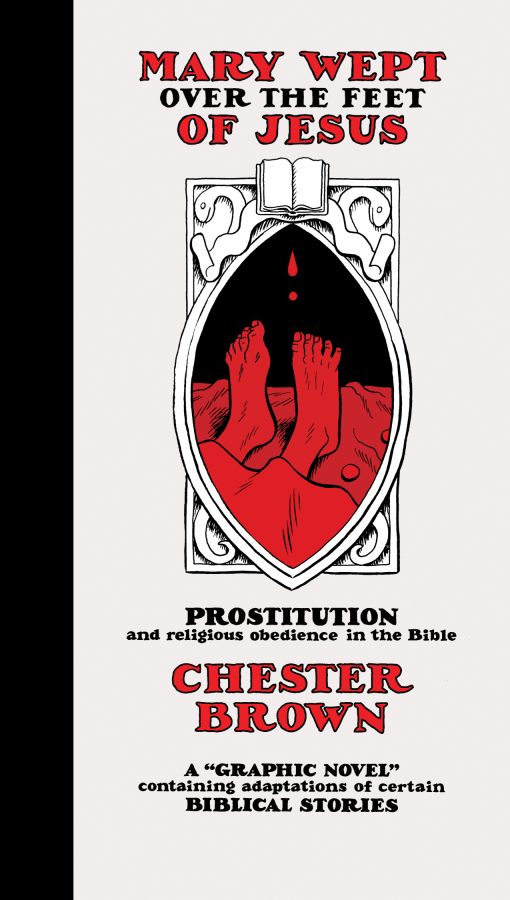Mary Wept Over The Feet of Jesus (2016)
 Canadian comic artist Chester Brown is probably the most well-known punter-writer our there. His latest, Mary Wept Over The Feet of Jesus: Prostitution And Religious Obedience In The Bible, is an analysis of the Bible as a graphic novel. (Maybe Brown likes illustration because most clients need pictures in their books.) This review of his newly published book is composed of an edited version of an email and g-chat conversation between Tina Horn and Caty Simon.
Canadian comic artist Chester Brown is probably the most well-known punter-writer our there. His latest, Mary Wept Over The Feet of Jesus: Prostitution And Religious Obedience In The Bible, is an analysis of the Bible as a graphic novel. (Maybe Brown likes illustration because most clients need pictures in their books.) This review of his newly published book is composed of an edited version of an email and g-chat conversation between Tina Horn and Caty Simon.
Caty: I was surprised by Chester Brown’s Christianity as demonstrated by this book. In its afterword, Brown explicitly identifies himself as a Christian, albeit one focused on mysticism who’s “interested in personally connecting with God, not in imposing my views on anyone else.” His avowed, classic libertarianism in his sex work client graphic novel memoir Paying For It (2011) would’ve had me assume that he was a fervent atheist a la Richard Dawkins. His libertarianism does come up at an interesting point in this book when he puts the words “it’s none of your business how other people spend their money” into Jesus’ mouth when he chides Judas for judging Mary because she spent money on anointing oils for Jesus’ feet rather than on charity.
Tina: Especially when you consider that he ran for Canadian Parliament in the Libertarian Party! This was in the years right before Paying for It came out.
Caty: So he’s actually having Jesus Christ parrot his party politics—that’s ballsy.
Tina: When I was a teenager, I thought Mere Christianity by C.S. Lewis was the shit, because it taught me more about what the Bible actually teaches than most of the aggressive Christian kids at my high school. Mary Wept puts me in mind of C.S. Lewis: a Christian highlighting the hypocrisy of other Christians through rational interpretation of their text.
Caty: When people say that Judeo-Christian values oppose prostitution, it gets me fuming, because it’s a lot more complicated than that. There are plenty of heroic whores in the Bible, and many more Biblical heroines who explicitly had transactional sex at some point in their stories. So I enjoyed how Brown highlights the stories of women like Rahab, the prostitute who sheltered Hebrew spies from discovery when they scouted out the city of Jericho, and Tamar, the woman who whored herself out to her father-in-law in disguise in a complicated plot to expose his hypocrisy. I only wish he’d included the story of badass Judith, the woman who beheaded the general Holofernes as he lay drunkenly asleep in her tent after possibly purchasing her services, ushering the Hebrew army to victory.
Maybe Brown felt like he just couldn’t compete with all the exquisite Renaissance and Baroque era artistic renditions of Judith in her moment of triumph, like this one:

But I think the real reason Brown didn’t include tales like Judith’s is because he seems more focused on outlining these sex work-related Biblical narratives in order to glorify sex workers’ clients. He has a convoluted thesis going about men whoremongering as a transcendent challenge to rigid religious dogma. This ascribes nonexistent significance to an activity which is really morally neutral, and it obscures all these awesome sex working Biblical women in stories which are about them. In a memoir about being a sex work client like Paying for It, centering the client perspective makes sense. But in a book like this, it feels beside the point. I’d love to see how this material would look tackled by a sex worker amateur Biblical scholar/comic book artist.
Tina: The book does explore the subjectivity of the clients more than that of the women. Brown’s reinterpretation of a lot of these stories seems to amount to, “God totally says it’s ok to be a whoremonger!” Which is great, but I would love to see more, “God says it’s totally cool to be a whore!” Not because I personally need the validation, but because undermining Christian values with their own text is a longtime favorite sport of mine.
Caty: So, what do you make of Brown depicting God as some sort of Biblical version of a WWE wrestler? His God is BUILT.
 I found this line weeks ago. I can’t remember when I wrote it or what brought it on. It was isolated on a sheet with other notes, none as dramatic. ‘I wanted to make strange men touch me.’ When did I want this? Or rather, when will I stop wanting this?
I found this line weeks ago. I can’t remember when I wrote it or what brought it on. It was isolated on a sheet with other notes, none as dramatic. ‘I wanted to make strange men touch me.’ When did I want this? Or rather, when will I stop wanting this?